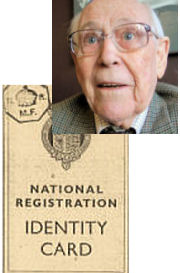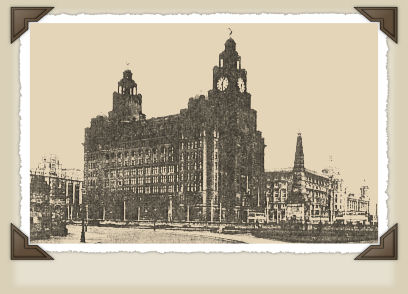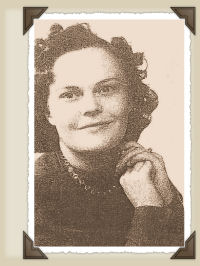Reminiscences
of my 60 years in South America | ||||||||||||||||||||||||
| ||||||||||||||||||||||||
Back
to Brazil - 1943 | ||||||||||||||||||||||||
"How
the hell did you get here" | ||||||||||||||||||||||||
Back
in Wartime Britain and my National Identity Card My next job was to obtain my Identity Card after which I was given some provisional ration cards to keep me going until I received my calling up papers. In the meantime, I went to visit my girl friend, Nona Shaw, whom I could only see at weekends as she was working at a branch of Martins Bank. I next called at the Booth Line office in Cunard Building in Liverpool. They did not seem overjoyed to see me and wanted to know when I would be having an eye examination, my excuse to come to England. It seemed to be taking a long time to receive my "papers" so I decided to pay a visit to my grandparents in Westcliff-on-Sea. Although non essential travel was not supposed to be undertaken, I decided to go anyway. I found them both well although much older looking and grandma was rather deaf. Whilst there, a loud noise brought me out into the street where I witnessed overhead 1000 Hercules bombers going to bomb Germany. I spent the night with them leaving the next morning for London. Strict security? Remembering
that Lieut Pullen, whom I met in Rio de Janeiro in 1940 when he was Naval Attache
at the British Embassy, was now at the Ministry of the Navy, I decided to call
upon him to see if he could arrange for a good place in the Navy. Not thinking,
I boldly entered the Ministry where a sailor was on guard at the sandbagged entrance.
I waved my arm at the armed sentry on duty with a cheery " ' Morning".
He smiled and saluted. Then pased a desk with several officers around and further
into the hall. Seeing an officer coming the other way, I asked him where Lieut
Pullen's office was. "Upstairs on the left", he replied. Upstairs I
saw a number of doors. In the first I opened, there were several officers or Admirals,
I don 't know which, having a discussion. "Beg your pardon", I said
as I shut the door. I opened the next door. Lieut Pullen was sitting a desk. He
looked up, a surprised look on his face. ""I'm Trevor Stephenson. We
met in Rio in 1940" I cheerily told him. "How the hell did you get here?
Didn't the guard stop you? Nobody is supposed to come up here without being checked
and word sent to me first?" I told him that I had just walked inside and
an officer had indicated where to go. He almost exploded. "Don't you know
that this place is high security. Nobody is supposed to get past the front door
without full searches being made." Back in Hoylake, Nona and I discussed this change in our plans and we agreed that we should get married as soon as possible. Then, when I received my orders to return to Brazil, Nona, as my wife, would be able to return with me. We were married one Saturday morning Arrangements were made accordingly and we were married one Saturday morning on the 17th October at a Registry Office in Chester in the presence of our respective families and my brother Andrew. Afterwards we all had lunch at a restaurant. Then we went to the Queens Hotel. In the evening we went to the Royalty Theatre to see Ralph Lynn and Tom Walls. Sunday, we had to return to Hoylake as Nona was due at work on Monday morning. On 22nd November came a letter from Booths that I was to proceed to Immingham to board the s.s."Basil" for New York. Nona was not allowed to accompany me as she did not have permission to leave the UK. If, at a later date, she was able to arrange such permission, then Booths would see she travelled out to me in Brazil. I left Liverpool by train for Hull on 1st December, Nona coming to see me off. The Booth Agent met me at Hull. My cabin trunk with all my clothes and wedding presents could not be found. It had been placed in the guard's van. Fortunately the trunk had the round Booth Line label with a large S in the middle. It turned up some ten days later and was delivered to my father. All I had was a small case with a change of clothes, my shaving kit and a clean shirt. I spent the night at a hotel in Hull. During the night there was an air raid warning. I slipped out of bed and went into the corridor. All was silent . Nobody was to be seen. I decided to go back to bed. My room was on the first floor so I reckoned I was more or less safe. In the morning, I learnt that everyone had gone downstairs to the basement. After breakfast I went with our Agent to Immingham where the Booth ship Basil was alongside. Aboard, the immigration officer stamped my passport, took away my remaining ration coupons and told me that I must not leave the ship. However, it was still being loaded with aviation gasoline and the Chief Officer told me the vessel would not sail until the 4th. I decided to return to Hoylake to spend at least a few more hours with Nona. Asking the crew not to give me away, I caught the first train back to Hoylake. Next day I called at the office where salvaged clothing was stored for bombed out persons and saying I had been ship wrecked, was given a very warm navy jersey, some underwear, a couple of shirts (a little too big) and a balaclava. On the 3rd December, I had to leave again. When I reached the quay at Immingham, the Basil was several metres away from the quay wall. Fortunately a motor launch was alongside and one of the officers ordered it to pick me up and take me alongside where i climbed up a rope ladder. Just in time! Barrage Balloons [Ed: Huge balloons tethered on heavy wires and raised into the flight path of enemy aircraft - the wires formed a terrifying obstacle] We had two barrage balloons tied to the railings to serve against airplane attacks but once out at sea, they both broke adrift. We sailed from Immingham to Grangemouth where we arrived on 9th December. Next day we left Grangemouth sailing round the north of Scotland, past Cape Wrath and into Greenock. Here we loaded a 6 inch cannon. We spent quite a long time in Greenock so I again went off to visit Nona. On two occasions I managed to stay over night. Then on Christmas Eve we set sail for San Miguel of the St Vincent Islands. . We sailed in convoy. There were two young radio chaps aboard and we soon became very good friends. Everyone had to do a job aboard. I was detailed to keep a lookout for submarines. . We arrived at Horta on 13th January. Here we unloaded the gasoline, then had to await another convoy for New York. Meanwhile we went ashore as much as possible, going to the cinema, eating at cafes and exploring the island. Then came the order to sail and join the convoy. There were some 20 vessels of all sorts and sizes. The weather was not particularly good and with little cargo aboard, our ship was light and moved up and down in a horrible fashion so had to forego various meals., Then one morning there was no sight of the convoy. Apparently our ship was so slow that the Commander had ordered us to proceed alone. We were all alone in the North Atlantic. We prayed that no submarines would come our way. Two days before reaching New York the weather was bitterly cold and wet. The rigging became thickly coated with ice so myself and some others were detailed to hack off the ice. We arrived at New York harbour on Saturday morning, 20th January. The immigration officers came aboard and stamped everyone's passport except mine. Apparently passengers were not expected in wartime. I was told that I would have to remain on board until Monday morning when another immigration officer would come aboard and allow me to enter the United States. "Keep straight on..." The crew were given green cards allowing them to come and go whilst the ship was in port. My two radio pals plus three other young sailors decided to go ashore, have lunch there and then see the town. I wanted to go but how to do so without a green card. Then the purser found a piece of green cardboard not too different a green from the official cards so he cut it to size and with black ink wrote some letters on it. No trouble going down the gangway as the guard presumed we all had cards. When we neared the exit gate, I walked at the end of our bunch of youngsters. We called out "Is this the right way for Fifth Avenue?" The guard on the gate shouted "Keep straight on" and waved us on obviously presuming that we were all crew from the ship and therefore with a permit to go. We had a wonderful time seeing the shops, Fifth Avenue, cafes etc. At one place, a young girl with her parents, saw us and asked if this was the first time we had come to New York, what ship we were on etc. Then she invited us all to visit her flat the following afternoon. Returning to our ship, there was the problem of how I was to enter. In the end we decided that as sailors are notorious for getting drunk ashore, we would act drunk. We linked arms, myself on the outside. Then swaying from side to side, singing and shouting, we waved our green cards in the air. The guard waved us through saying "Careful you don't fall into the water". And so I went in and out as well as on Sunday. On Monday as I was now legally in the country, I called at the office of Booth American Shipping Corporation for instructions. I was told that the Norwegian vessel Rio Branco would be sailing in a few days time and I was to proceed to Pará by her. Meanwhile, I was put up at the Harvard Club and told to go to the office each day to talk about the North Brazilian Agencies. The Rio Branco..on the command ' Abandon ship'.... On 22nd February I boarded the Rio Branco. Shortly after embarking, a sailor knocked at my cabin door to say there was lifeboat drill, to don my life jacket and assemble on deck. Everyone was lined up. Then the order came "Abandon ship" We all climbed down netting hung over the ship of the vessel and into lifeboats. When all were accounted for, the order was given to climb back on board. A good exercise. We sailed in an American convoy patrolled by two corvettes. We zigzagged our way. The Captain, a very nice fellow, advised me to wear my life jacket most of the time. Before dinner each evening, I would sit with the captain on the deck by his cabin, drinking beer and playing cards. Then, one evening, one of the corvettes signalled that we were showing a light. The Captain called a sailor to find where it was and to extinguish it. "But it is your light, "Captain". We had a storm lantern lit so we could see to play cards. It was extinguished. On 13th February we arrived at Port of Spain, Trinidad. After the visit, the Captain and I were invited to tour the Angostura Bitters Plant. We had a most interesting tour of the works followed by a delicious Planters Punch. We were each given a small bottle of bitters and a book all about the history of Angostura and many interesting recipes not only for cocktails but also for culinary dishes. I still treasure the book. Rio Branco is torpedoed Shortly after leaving Trinidad, we heard several loud noises and felt some jolts. The Captain reported that a submarine had been spotted and that our depth charges were being dropped. We were told to scatter so we increased speed and zigzagged away and nearer to the coast of Venezuela. All was quiet and a few days later on 24th March, we entered the Amazon and tied up to the dock. Macrae came aboard to greet me saying that I was to sail the next day for São Luís by the Lloyd Brasileiro ship Pará At São Luís I was to take the train for Teresina and then to Parnahyba. He also informed me that the news in Belem was that the Rio Branco had been torpedoed and sunk with large loss of life! The Pará had just landed a group of families from Ceará in the Brasilian northeast where a drought had caused much suffering. The families were moved to the interior of Pará State and to the Island of Marajó in the mouth of the Amazon. The ship smelt and the stink in my cabin was awful. At Sao Luiz I was met by Leigh Bryan and I spent the rest of the day and night at the staff house. Early next morning I went to the railway station and boarded the train which left at 7 am. Not long afterwards, the train stopped by some straw huts. The Driver and Engineer got off the locomotive and disappeared into one of the huts. Twenty minutes later they reappeared swiping their mouths. They had stopped for breakfast. It was very hot in the train even though all the windows were open. Then suddenly the train stopped. Smoke was coming from the axle boxes. A number of second class passengers got off the train and started gathering bunches of grass which they stuffed into the axle boxes. We continued on our way. One of the passengers sitting in front of me said that the engineers often sold any grease over and used grass to see the train to its destination. Around 5 pm, the train again stopped. This time the guard came through the carriages telling everyone to sit down, not to move and to keep all windows shut and the blinds drawn. Then the train crept forward. Looking out of a corner of the blind, I saw we were crossing the river but the veranda of the bridge was so close to the side of the train that I feared we might scrape it at any moment. I learnt later that on windy days, passengers cross the river by canoe whilst the train remains behind. At the station I took a taxi. The driver asked whether I was married or single. I decided to say "single" as I thought I might get a cheaper Hotel. Next morning early, I went to the station and boarded the train for Parnahyba. I was not feeling too well so ate nothing on route. I guessed that I might have caught malaria aboard the Raul Soares. After a hot and weary trip, we finally arrived at Parnahyba where I was met by R.J.Smith who took me to the staff house. And so ended my trip to the UK in war time, getting married but having to return alone. What I did not realise at the time was that I was suffering from para-typhoid and would end up in hospital.
| ||||||||||||||||||||||||
A Wartime marriage - like many wartime marriages Trevor's to Nona did not last. Often the couples separated due to the enormous uncertainties of living or dying such as his close encounter with the fate of the Rio Branco. | ||||||||||||||||||||||||
| Nona and I were married believing that she could accompany me back to Brazil. However, the Government stated that she was not entitled to leave the UK until the war was over. We spent five days together. Then I went off to Brazil. Time passed and in 1945 when she was allowed to travel we both felt that we had been too long apart and too little together so we decided to divorce on the grounds of 'abandonment'. She already had a boyfriend. They married and she went to Australia. When I came to the UK in 1990, I wrote to her brother who gave me her address in Britain as she had returned as her husband had died. We maintained contact by letter in England and 'phone until she herself died. | ||||||||||||||||||||||||
|


